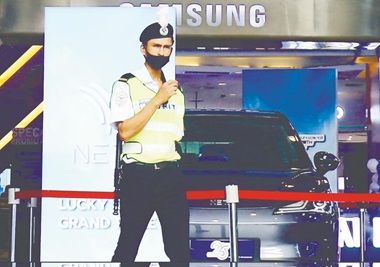About 50,000 foreigners are working illegally in Malaysia as security guards despite a Home Ministry circular allowing only Nepali nationals and Malaysians to be employed as such, said Malaysia Security Industry Association president Datuk Mohammad Ubaidillah Iman.
“Due to the growing numbers of illegally employed security guards, my association has raised the matter with the police, Immigration and Home Ministry officials, but action has been slow and lacks any impact.
“If foreign security guards are not vetted to ensure they are only Nepali nationals, as per Home Ministry requirements, there can be dire consequences for the safety of homes and buildings in Malaysia,” he said.
Lawyer Kokila Vaani Vadiveloo also confirmed that the ministry only allows Malaysian and Nepali nationals to work as security guards in the country, according to Section 3(4) of the Private Agencies Act 1971 (No. 27/71) (Security Control Services) as enforced by the ministry.
“In 2010, due to some agencies hiring security guards illegally and failing to meet operational conditions, the government issued Circular No. 4 2010 for Private Agencies. It clearly states that only Nepali nationals who are retired soldiers are permitted to work as security guards.
“Additionally, individuals or companies that illegally employ other nationals and illegal immigrants as security guards can be charged under Section 55B of the Immigration Act 1959/63 (Act 155). They can face imprisonment of up to 12 months and be fined not less than RM10,000 but not more than RM50,000 (for each offence).” She said employing more than five illegal workers will result in imprisonment of not less than six months but not more than five years, and may include up to six strokes of the cane.
Mohammad Ubaidillah said as the number of former soldiers decreased, the ministry opened employment as security guards to other Nepali nationals instead of just confining such employment to retired soldiers. He said as of August this year, about 200,000 security guards have been registered with the ministry, namely 138,431 locals and 58,760 Nepali nationals.
“The problem with illegally employed security guards is that we cannot identify them since they have not undergone proper screening. If you see anyone other than Nepali nationals working in the profession, then they are illegal and unauthorised.” Mohammad Ubaidillah said the growth of illegal security companies remains unchecked by authorities and this has compromised the quality of security services, apart from threatening the stability and credibility of the entire industry.
“The illegal security companies pose a risk to society, especially if the foreign guards they employ have criminal records in their home countries. If any incidents occur involving these guards while they are on duty, it becomes almost impossible to file a report or take appropriate action against them.”








